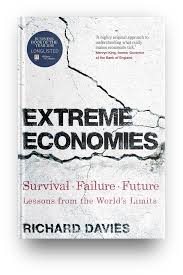Studies of extreme medical abnormalities have led to breakthroughs in understanding how anatomy and physiology works in normal people. Early studies of industrial and transport accidents led to more advanced engineering, and created the field of materials science. Extreme Economies, by Richard Davies applies this principle to apply the same concept to economics. This approach yields important insights on how markets and societies function. This book is essential reading for emerging and frontier market investors.
Survival, Failure, and The Future
Extreme economies covers nine case studies, across three different types of extreme: Survival, Failure and Future. Out of these case studies, seven are extremely relevant for emerging and frontier market investors.
- Aceh, Indonesia was the village hit hardest by a 2004 tsunami. Villagers had to rebuild after losing everything, but the area was thriving just a few years later. (Survival)
- Zaatari, Jordan was a refugee camp for people who fled the Syrian Civil War. Vibrant markets developed for just about every type of consumer good. Survival)
- The Darien Gap between Colombia and Panama has a massive amount of natural wealth, but it functions as a dangerous haven for criminal activity. (Failure)
- Kinshasa, Democratic Republic of Congo is the poorest major city on earth. Due to extensive corruption, people have no choice but to operate illegaly. (Failure)
- Glasgow, Scotland isn’t an emerging market, but its fall from one of the most successful cities in the world, to the most troubled city in Britain is a cautionary tale, especially for countries that are on the edge of emerging/developed statuses. (Failure)
- Estonia is one of the most tech savvy countries in the world, with many lessons for other countries. (Future)
- Chile is a cautionary tale in the application of overly dogmatic market friendly policy. (Future)
Two other case studies also have indirect lessons. One concerns the development of high tech currencies in the prison economy. The other concerns the most aged region in Japan.
Here are three key lessons for emerging market investors.
Look beyond official statistics
Often official statistics conceal more than they reveal about the operations of the economy. Kinshasa’s official statistics fail to capture any of the informal trade going on just beyond the government’s grasp. Different refugee camps may appear the same on a spreadsheet, but one can have a thriving economy while the other doesn’t. Statistics on the Darien Gap are nearly nonexistent, but the outlaw economy is huge. Additionally, inmates’ innovative use of cash cards would not be apparent from looking at official statistics. Official statistics capture most physical and financial capital, but they fail to capture human capital. Only by visiting people can one uncover hidden sources of human capital.
Emerging market investors need to do on the ground research to succeed.
Pay attention to culture
Emerging market investors need to pay attention to culture. In Aceh, Indonesia villagers have a long standing tradition of putting their wealth into gold jewelry, rather than banks. As a result, they were able to quickly and efficiently restart their businesses and lives. Since gold is an international market, there was no price gouging. In Glasgow, families in housing blocks operated informal safety nets that ensured no one fell into poverty when they lost their job. These informal cultural mechanisms have hidden value.
Avoid policy dogma
As well as helping to clarify the destination, extremes point to pitfalls along the way. Pressurized and damaged places pare economics back to a simple and raw form, often revealing modern examples of the role of free markets.
People on the right and left often have dogmatic views about the role of the government in the markets. Yet examples of extremes show the perils of dogmatism. Markets ignore externalities and can lead to social unrest, which makes it difficult to make money. On the other hand, government policy usually has unintended consequences. Emerging and frontier market investors should keep their ideology out of investment analysis, and look at the actual facts on the ground.
Extreme Lessons
Extreme Economies, which focuses on the nitty gritty of the “real economy,” pairs well with two of my old favorites- Barton Biggs’ “Wealth War and Wisdom“, and Robert Smith’s “Riches Among the Ruins” which focus more on capital markets.



